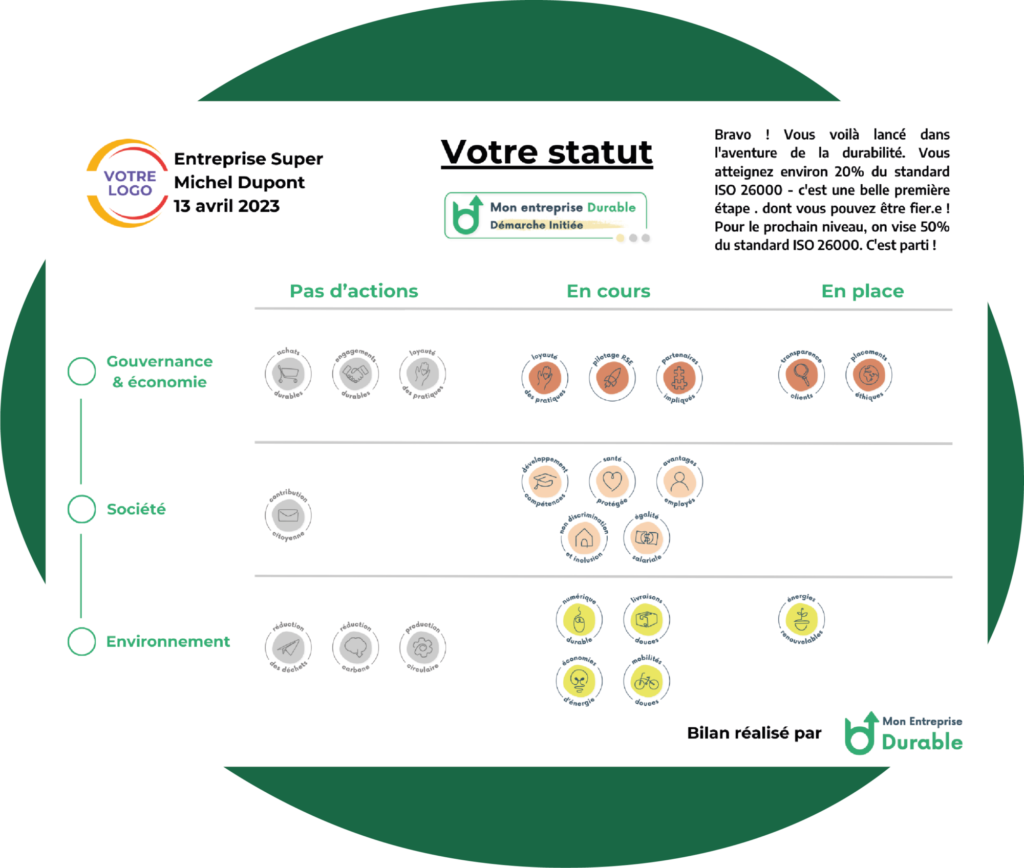All you need to know about CSR audits!
In 2021, the HEG Geneva CSR Barometer revealed that 78% of Swiss companies have implemented formal or informal CSR measures.
These measures are taken by several types of company, whatever their sector of activity, size or sales figures.
Indeed, we note that VSEs and SMEs with sales of less than 0.5 million euros are just as likely to implement eco-responsible initiatives as larger companies.
Key points of the article
Corporate Social Responsibility (CSR) concerns all companies, and is becoming an increasingly integral part of their approach, decisions and actions.
However, regular audits are essential to the success of your CSR approach.
CSR auditing is a real performance lever that can help you achieve your objectives on time.
But what is it?
What is a CSR audit, and what does it have to do with CSR?
What’s the point?
Here’s everything you need to know before embarking on your CSR audit, so that you can offer your company more sustainable and responsible prospects.As an integral part of society, companies have a role to play in the well-being of their employees, as well as in environmental impact, the reduction of inequalities, access to employment and regional development.
The UN’s sustainable development goals cannot be achieved without them.
These objectives are structured around 5 pillars: environment, social, economy, governance and territory.
This is the primary aim of CSR: to encourage participation and increase the contribution of companies to achieving the 17 goals set by the UN.
What is a CSR audit?
A CSR audit is a tool for assessing a company’s performance in terms of its CSR approach.
It assesses the company’s societal, social and environmental performance, as well as its governance and integration into the local community.
This audit can be carried out either in-house or by a specialized firm.
An audit is a diagnosis, a study, which will enable the company to know where it stands in each CSR-related area and what it still needs to improve.
There are several ways of carrying out an audit.
Firstly, there are fixed audit grids and labels to ensure that your objectives are met.
Alternatively, a company can set up its own indicators, more suited to its action plan and activity.
In this case, we recommend using the SMART indicator method.
Your objectives must be specific (precise), measurable, achievable, realistic and time-bound.
In all cases, you can involve your staff by allowing them to follow all progress internally.
To do this, you can use a collaborative Dashboard or schedule regular meetings.
All members of the company will then be kept up to date on the CSR approach, and will be able to participate and put forward their ideas.
Why conduct a CSR audit?
Monitoring the progress of your CSR approach is crucial.
You can evaluate the progress of your approach, identify difficulties and obstacles, relaunch actions that have come to a standstill, measure the success of certain actions, but also see what changes need to be made to improve your results.
The information gathered during the CSR audit is essential to the success of your approach.
It also helps to keep your staff involved in the process.
The CSR approach should not be a project you launch and never come back to.
A CSR audit is also a way of ensuring that you meet all regulatory requirements.
It’s an opportunity to check that you’re up to date with the latest regulations.
You can also take the opportunity to find out what your employees and customers expect of you.
CSR diagnostics and the publication of the results, for your employees and customers, give you greater credibility.
In fact, it allows you to promote your positions from a responsible and environmental point of view, which is not insignificant for your brand image.
How to obtain CSR certification?
There are a multitude of CSR-related certifications and labels.
There are even specific labels depending on your sector of activity and/or the size of your company.
To obtain them, you need to pass an assessment by those who have developed the labels, and meet the criteria set.
Certification gives you much greater credibility in your CSR approach, but also enables you to set yourself precise objectives.
This is particularly useful if you don’t know how to go about improving your impact on society.
When it comes to certification and labeling, you’re spoilt for choice: EcoEntreprise, Entreprise citoyenne, B Cor, EcoVaids, Afnor and various ISO standards relating to quality, the environment, health, safety, energy and sustainable development are all available.
Some labels have even been developed specifically for certain regions: these are known as cantonal labels.
Major supporters of chambers of commerce, these labels offer greater speed at a lower cost than certifications.
One example is Carbon Fri, which was launched in 2018 and aims to support SMEs in reducing their CO2 impact.
To ensure the success of your CSR project, we recommend that you follow a number of steps.
These steps will help you build a project that is viable and sustainable over the long term. Once your CSR approach has been put in place, it’s important to communicate on your actions and, above all, to monitor your performance.
When should a CSR audit be carried out?
Carrying out a CSR audit is relevant at several stages of your project.
First of all, you can do one right from the start.
This first audit will enable you to take stock of the situation, what you want to improve, what you need to put in place and what difficulties you need to overcome.
It’s also an opportunity to see if you’re lagging behind in terms of legislation.
Next, it’s a good idea to carry out regular audits.
In this way, you can ensure that the project is on track, that progress is being made, and that regulatory changes, for example, are being taken into account.
These audits are also intended to help your teams to work regularly on implementing this CSR approach and ensuring its success.
In this way, CSR becomes an integral part of their working time, and of the way they think about new projects.
In an optimal CSR approach, you need to set yourself deadlines for achieving your objectives.
When these deadlines arrive, it’s time to carry out an audit of your performance.
This audit will tell you whether your objectives have been achieved, and if not, why not.
What is the CSR audit grid?
The CSR audit grids are the audit evaluation tools.
You can create a grid for each objective in each sector.
For example, your objective of reducing energy consumption in the context of reducing environmental impact will have its own grid.
These objectives can be environmental, social, societal, ethical, communicative or even CSR management-related.
This grid needs to be populated with a range of information.
To do this, you’ll need to carry out a complete study of your production methods and their impact, and your progress towards your final objective.
The audit grid is a tool for visualizing progress and potential delays in each sector.
Consequently, its precise content depends on each item to be monitored and on your activities.
Generally speaking, audit grids use 5 levels of progress.
However, you can adapt your grids according to your objectives, but this is only an indication.
The most important thing is that your evaluation grids are precise and clearly indicate improvements and delays.
- Level 1: Behind
This level means that nothing has been put in place, or even thought about.
For example, if you’re at level 1 in terms of energy consumption, this means that you haven’t put any action in place, nor thought about any particular measure.
It could also mean that you’re lagging behind legislation. - Level 2: Unstructured action
At this level, you’ve thought about actions, but you haven’t put in place any organization or structuring to ensure follow-up action.
These actions are not necessarily coordinated either. - Level 3: Action implemented and organized
In this case, you have a method and an action plan.
You have defined an organization that should enable you to achieve your objectives. - Level 4: Effective action plan and reflection for the future
At Level 4, you have implemented your action plan and achieved positive results.
You’re thinking about new actions for the future.
You’re keeping an eye on regulations and trying to anticipate them. - Level 5: Active participation and early implementation
For this last level, your action plan is up and running, and you’re seeing results.
You have even already implemented measures that anticipate the regulations.
As a company that is ahead of the game in this respect, you can communicate about your actions and carry out advocacy and awareness-raising campaigns to influence other companies to follow suit.
Ideally, you should carry out an audit of all the areas you wish to improve as part of your CSR approach: environmental, societal, social, governance, territorial development… Your audit should be precise and may also touch on your CSR communication, your transparency policy, your choice of partner companies, your regulatory monitoring methods, your CSR management, and many others.
Here are a few examples.
Audit your environmental performance
For your environmental performance, you need to focus on several elements and adapt your evaluation grids.
Each element needs to be studied.
In this way, you’ll be able to determine the level of advancement of each element in your evaluation grid.
For example, you can draw up a carbon footprint and track your greenhouse gas emissions.
This assessment grid will need to encompass all the actions taken to reduce your emissions, whether in terms of mobility or more responsible purchasing decisions, for example.
You can measure your actions on: energy consumption, water consumption and pollution, your impact on flora and fauna, the use of renewable energies, the geographical distribution of your company and the companies that supply you, the proportion of waste recycled and the volume of your waste, the proportion of your journeys made using clean means of transport, the percentage of days worked teleworking, but also the percentage of Swiss or even more local partner companies, for example.
Audit your social and societal performance
For this type of audit, you can analyze your progress in terms of gender equality (equal pay and access to employment), the rate of permanent contracts, the satisfaction and well-being of your employees and health at work (with data such as absenteeism, accident risk, measures taken in the event of contact with a dangerous product, for example).
You can also help young people find employment by offering internships, work-study programs or positions for young people who have just graduated.
You can also track the number of jobs accessible to people with disabilities, as well as the accessibility of your premises and services/products for them.
Audit your CSR communications
It’s a good idea to devote part of your audit to your CSR communications.
This will enable you to define who you are communicating with (whether it’s exclusively in-house or not), and through which channels.
Communication is important when it comes to CSR, as it enables you to reap the marketing and attractiveness benefits for your company.
It’s also a way of lending credibility to your approach by making it important.
It shows that your approach is structured and well thought-out.
For this audit, you can find out what your employees know about your approach and how they feel about it.
This is particularly useful for identifying communication practices that work, and those that are unhelpful or even counter-productive.




